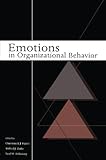Emotions in organizational behavior / edited by Charmine E.J. Hartel, Wilfred J. Zerbe, Neal M. Ashkanasy.
Material type: TextPublication details: Mahwah, N.J. : Lawrence Erlbaum Associates, c2005.Description: xxv, 425 p. : ill ; 24 cmISBN:
TextPublication details: Mahwah, N.J. : Lawrence Erlbaum Associates, c2005.Description: xxv, 425 p. : ill ; 24 cmISBN: - 9780805861785
- 302.35 EM OT
| Item type | Current library | Call number | Status | Date due | Barcode | |
|---|---|---|---|---|---|---|
| REGULAR | University of Wollongong in Dubai Main Collection | 302.35 EM OT (Browse shelf(Opens below)) | Available | T0036117 |
Includes bibliographical references (p. 369-405) and indexes.
"Workplace emotion has finally arrived!" So proclaims the foreword writer to a volume (referred to in the preface as v.3 in an unnamed series), which brings to a broader audience of academics, students, and managers research papers presented at a 2002 conference on organizational behavior and emotionality. Härtel (Deakin Business School, Melbourne, Australia) introduces the field of organizational behavior; and the concept of "bounded emotionality" (1993) as versus Simon's (1976) "bounded rationality," which brought the cognitive revolution to management theory. The 19 chapters view emotions' roles, e.g., in change, at the individual, interpersonal, and organizational levels.
There are no comments on this title.
